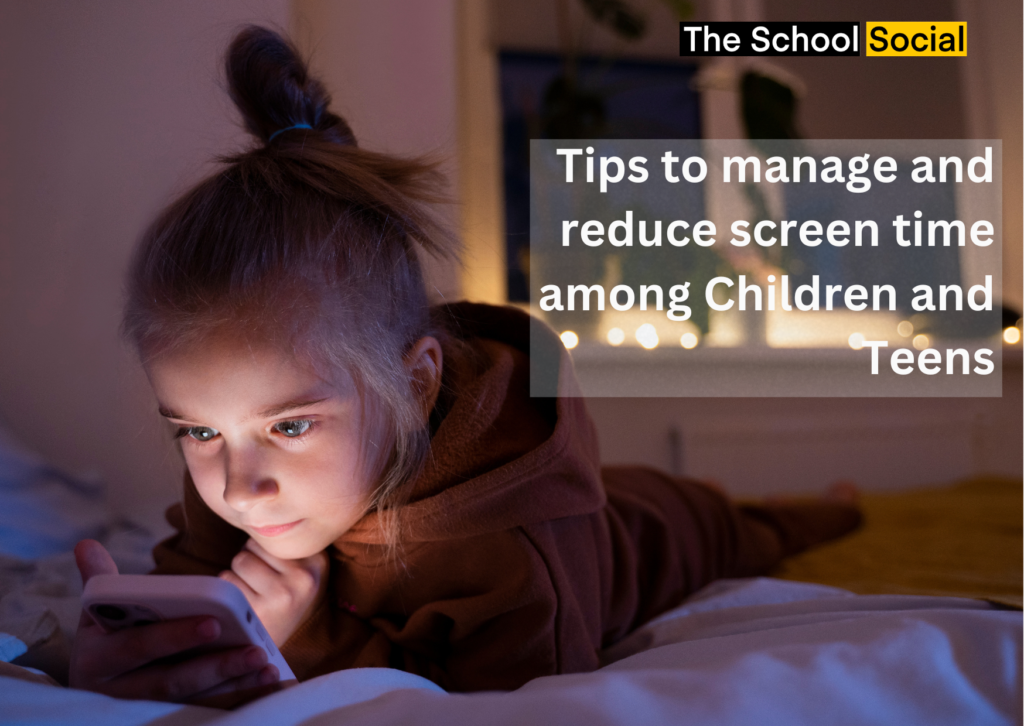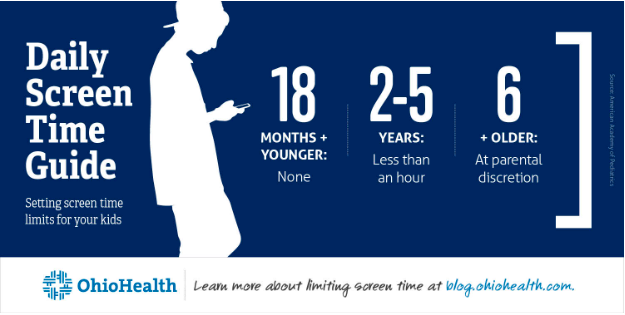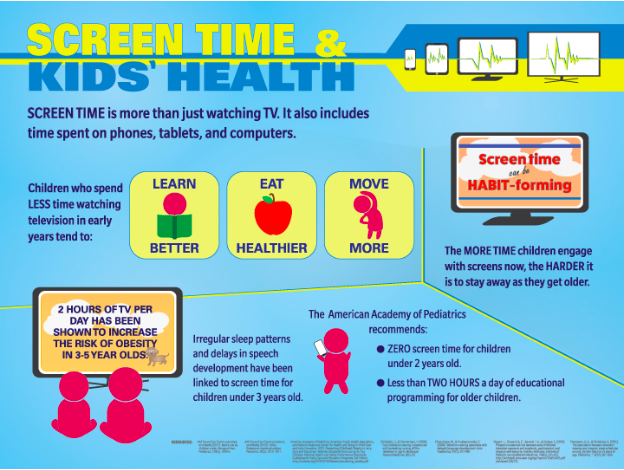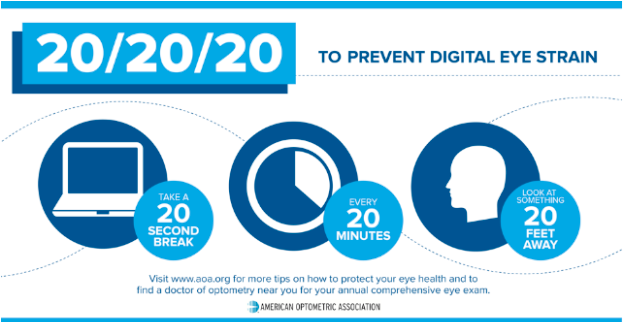
Today technology has become the driving force of the world. Whether it is writing a to-do list to launch a rocket into space, everything is happening using gadgets and the Internet. Entertainment, information, communication, etc have become so accessible and fast that everyone is going online. And in that everyone, toddlers and children are also included. As parents, you might be concerned about their overuse of devices, and would want to reduce screen time among children and teens as much as possible.
Parents, you’re not wrong! According to a study published in the journal JAMA Pediatrics, children who use electronic gadgets for 2 hours or more a day are more susceptible to attention problems. Another study published in The Journal of Pediatrics said that children who watch TV for more than two hours a day are more prone to obesity.
Here are some research-backed tips that you can help you inculcate in everyday life to reduce the screen time of your children.
- Set Screen Time Limits:
American Association of Pediatrics suggest that there should be no screen time for children below 2 years of age. And less than 1 hour per day for children aged 2-5 years. For the rest of the age groups, it’s up to two hours. So set screen time for children accordingly and make sure they abide by them.
- Establishing Screen-Free Time during a Day:
Having screen-free time in a day, when absolutely no gadgets would be used would not only reduce their dependence on electronic devices but would also encourage face-to-face interaction and familial relationships. This could be during meals or evenings when it’s time for play or bedtime. - Be a role model: Children learn from their parents. So they’d do what they see their parents doing. So as a parent, you yourself should use devices in moderation. Set-screen time limits for yourself too and interact with your children more.
- Encourage Physical Activity: Instead of sitting in one place all the time on their phone, children should go out to play or do something physical. This would not only improve their health but would also reduce their screen time and side effects of it like a strain on the eyes, harmful rays from the devices, etc.

- Use digital media together:
When they are doing something online, sit with them and see what they are doing. They might be playing a game, or watching a video, or maybe reading something. This way you can not only monitor what they are doing but also subtly make suggestions to make their screen time meaningful. This could be suggesting an informative show to watch, playing some learning games, or online books to read. - The 20-20-20 rule: Suggested by renowned optometrist Dr. Jeffrey Anshel, this rule says that after every 20 minutes of screen time, look at something 20 feet away for 20 seconds. This is a good way to reduce strain on the eyes and get a break from the screen. Try to inculcate this habit in your children.

- Screen-free zones:
Just like setting screen-free time, you can also set screen-free zones in your house. These zones could be your dining hall, garden, or study room. In these places, mobile phones or laptops shall not be used by not only children but any family member. - Communicate that digital media is important:
In today’s digitalized world, technology has become an integral part of any person’s life. So, you as a parent cannot restrict them from using digital media. Rather you need to realize that it is important to them and also communicate this to them. Seeing your acceptance would compel them to use tech in moderation as a sign of reciprocation. - Family Media Contract:
You can sit with your family and form a contract regarding the use of tech devices and media. This may include rules about usage, when and where to use, prohibited websites, rules about privacy and personal information, etc. This may also include consequences for breaking any of the rules. Such a contract can define the children’s behavior on the usage, and discipline the family as a whole.
A suggestion from the team of The School Social Don’t expose children below or up to 3 years of age to electronic devices. A habit developed in young ones stays for long. Even after the age of 3, restrict the usage as much as possible even if it means bearing their tantrums. You can visit the Media Policy Brief by the London School of Economics and Political Science for more details.
You must’ve told your children that excessive usage of gadgets is harmful to health, not to use too much otherwise your studies would be affected, do some physical activity and don’t sit in one place all the time. Well, your worries are in fact right and backed by scientific research!
In this article, we’d try to answer the queries of you parents regarding the screen time and electronic usage of your children using factual data from various studies and journals.
FAQ’s on screen time for Children
Is more screen time harmful to children’s health?
Yes, it is! According to various research, more screen time in children may cause attention problems, sleep depravity, obesity, and lower academic performance. According to the University of Oxford, children spending more than 4 hours per day on screens are more prone to being overweight. Another study by the University of Pittsburgh says that more than 2 hours of screen time is more likely to develop attention problems.
How much screen time is appropriate for my child?
According to a study by the American Academy of Pediatrics, toddlers up to two years of age should have no screen time. Children from 2-5 years of age should not have more than 1 hour of screen time a day. For the age group of five years and above, it depends on parents’ discretion on what screen time they allow but it is advised not to be more than 2 hours a day.
Does screen time also affect the mental health of children?
You would be surprised to know that increased screen time may develop symptoms of anxiety and depression among children and adolescents. This is stated by research published in JAMA Pediatrics and Psychological Medicine. It indeed affects a child’s mental health.
Why is there a need to limit the screen time of my child?
The reasons to limit screen time on your child are not limited to physical and mental health problems. It goes beyond that. This includes the perspective of life as a whole. Living in the virtual world more than the real world may destroy the child’s future. He might not only lose various opportunities for his career development but developing an addiction will render him useless and incapable of interaction with society in general. Not just that, but if the physical or health problems become severe, that would ruin your child’s life.
Is time spent watching TV also included in screen time?
Any kind of engagement with electronic screens is included in the screen time. This includes time spent on computers, smartphones, laptops, tablets, gaming consoles, and television (TV) too.
What is the WHO recommendation on screen time usage for children?
WHO has given recommendations for children of 5 years and below that they should sit less and play more. According to the recommendations, there should be no sedentary screen time for children aged 0-2 years. For children aged 2-4 years of age, sedentary screen time should not be more than 1 hour.
What is the screen time limit for toddlers with autism?
Even for toddlers with autism, the screen time limit is the same as suggested by the American Academy of Pediatrics, i.e., no screen time up to 2 years of age, and a maximum of one hour of screen time for 2-5 years of age.
Is screen time harmful to children’s eyesight?
There has been no definitive evidence that screen time can directly affect the eyesight of a child or a person in general. But studies by the American Academy of Ophthalmology, University of Toledo, SCORM, NIOSH, etc. have given their insights on the effect of screen time on eye health. These studies have stated that increased screen time causes eye dryness, irritation, discomfort, and possible damage to retina cells due to blue rays. The study by SCORM showed increased chances of developing myopia due to increased screen time.
In conclusion, it is extremely crucial to reduce screen time, especially among children. For tips on how you reduce screen time, do visit The School Social’s blog here.
